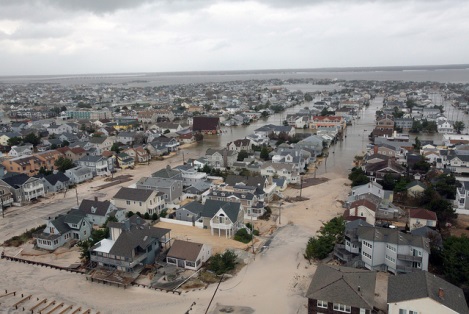New Jersey Governor Chris Christie, in his State of the State speech last night, said very little about energy and nothing about climate change. But it’s easy to see climate and energy all over his speech, if you just know where to look.
Drug addiction and fossil fuels

Photo: Governor’s Office/Tim Larsen
Gov. Christie spent a good chunk of his speech talking about drug addiction and how the state should be dealing with it. It’s a serious issue, and the governor proposed a range of responses.
It’s hard for some of us to hear the word “addiction,” though, and not think about other things that hold us in thrall in serious and damaging ways—in particular, in the energy space.
President George W. Bush himself made the connection, in his own State (of the Union) address in 2006, when he lamented the nation’s unhealthy attachment to black gold, and pointed the way to solutions:
And here we have a serious problem: America is addicted to oil…
The best way to break this addiction is through technology,… cleaner, cheaper and more reliable alternative energy sources. And we are on the threshold of incredible advances.
Expand “oil” to “fossil fuels,” and the same solution set still applies.
In Gov. Christie’s speech, though, the topic of energy earned only one little line, when he correctly noted that the state is #3 in the use of solar power. Nothing about the problem, and very little about the solution side.
Even that one stat says something about where the state is headed in dealing with its energy addiction troubles: at the beginning of the Christie administration, New Jersey was solidly in the #2 spot.
New Jersey needs a consistent, forward-pushing framework for driving solar and other renewable energy sources.
Unfunded liabilities and climate change
Gov. Christie also talked a lot about unfunded liabilities, pensions, and the reforms he thought were needed. Many states are wrestling with how to make wise decisions now to put us in better shape to meet future obligations.

New Jersey coastline after superstorm Sandy. Sea level rise is contributing to worsening storm surge and coastal flooding. (Photo: Flickr/U.S. Air Force photo by Master Sgt. Mark C. Olsen)
One case of not investing enough now to stave off future troubles, though, was missing from his words: In his speech, the governor included nothing about climate change, the mother of all unfunded liabilities.
Not even a mention of Hurricane Sandy, as the New York Times and others have pointed out, despite his strong earlier commitment to “not rest until every person hurt by Sandy has their life back.”
As he was enumerating New Jersey’s many assets, Gov. Christie mentioned “the shore.” I know from my New Jersey days and happy times spent at the Jersey shore that it truly is a treasure.
But in the context of climate change, the Garden State’s 130 miles of coastline has to be seen as also sitting on the liability side of the ledger. Rising seas and increased tidal flooding mean that, within the life of a mortgage, in many places daily life will be disrupted by flooding from high tides alone.
UCS’s recent Encroaching Tides analysis found that in 2045 Cape May, NJ, could see as many as 300 floods from high tides, while Atlantic City can expect more than 240.
Sadly, the Christie administration’s most notable “contribution” to New Jersey’s climate change fight has been in the wrong direction, when the governor effectively withdrew the state from the Regional Greenhouse Gas Initiative. RGGI, the 10-state (make that 9-state) bipartisan effort launched in 2009, has shown the way to helping the market see that, since carbon dioxide has a cost, it needs to have a price, too.
Gov. Christie was wrong to pull New Jersey out of RGGI, and he should accelerate the reentry now in process in the legislature by doing the right thing himself.
Renewing the Garden State
Gov. Christie was right to talk about renewal, as he did toward the end of his speech. To the litany of needed renewals, here are a few more that he could have promoted:
- A renewal of the state’s commitment to RGGI as a proven tool for putting markets to work to address carbon directly.
- A renewal of the state’s commitment to moving quickly toward a cleaner energy mix, with all the energy efficiency, solar, offshore wind, and other renewable energy it can find.
- A renewal of the state’s commitment to fighting climate change with everything New Jersey has its disposal.
We need leadership on climate and energy, and we need our leaders to be talking seriously about both every chance they get. In New Jersey and far beyond.
